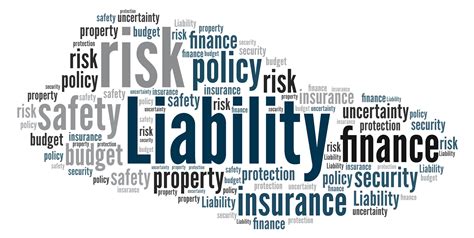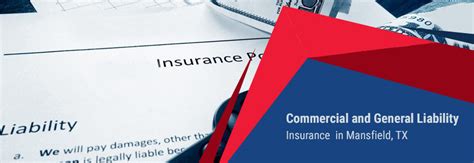Insurance Liability Business

In the world of business, understanding and managing risks is crucial for long-term success and sustainability. One of the key aspects of risk management is insurance, particularly liability insurance. Liability insurance is a cornerstone of any business strategy, offering protection against a wide range of potential legal and financial liabilities that can arise from the normal course of operations. This article delves deep into the world of insurance liability in business, exploring its significance, the various types, how it works, and its critical role in mitigating risks and ensuring business continuity.
The Importance of Insurance Liability in Business

Insurance liability is a fundamental component of risk management for businesses of all sizes and industries. It provides a safety net, safeguarding companies from the potentially devastating financial consequences of legal claims, lawsuits, and other liability-inducing events. These liabilities can stem from a myriad of sources, including but not limited to:
- Product liability: When a company's product causes harm or damage to a customer.
- Professional liability: Mistakes or negligence in the delivery of professional services.
- General liability: Covers a broad range of potential accidents or injuries that occur on a business's property.
- Environmental liability: Liability arising from environmental damage or pollution caused by a business's operations.
- Cyber liability: Increasingly important, this covers costs associated with data breaches, cyber attacks, and online privacy violations.
The potential financial implications of these liabilities can be catastrophic for businesses, often involving substantial legal fees, settlements, or damages awards. Without adequate insurance coverage, these costs can cripple a business, leading to bankruptcy or severe operational disruptions.
Types of Insurance Liability

Insurance liability is not a one-size-fits-all concept. Different types of insurance policies exist to cover various aspects of business liability. Here are some of the most common types:
General Liability Insurance
General liability insurance is a broad form of coverage that protects businesses from financial loss arising out of property damage, bodily injury, personal injury, or advertising injury. It’s a catch-all policy designed to cover a wide range of potential risks, making it a fundamental aspect of business insurance.
For instance, if a customer slips and falls on a wet floor in your store, general liability insurance can cover the medical costs and potential legal fees. It also covers legal defense costs if your business is sued, even if the lawsuit is groundless.
Product Liability Insurance
Product liability insurance is specifically designed to protect businesses that manufacture, sell, or distribute products. It provides coverage if a product causes harm or damage to a consumer or their property. This type of insurance is particularly important for companies involved in the manufacturing or retail industries, as product defects or design flaws can lead to significant liabilities.
Professional Liability Insurance
Also known as errors and omissions (E&O) insurance, professional liability insurance is tailored for businesses that provide professional services. It covers legal costs and damages arising from alleged or actual negligent acts, errors, or omissions in the performance of professional duties. This type of insurance is crucial for industries such as consulting, legal services, healthcare, and accounting.
Environmental Liability Insurance
Environmental liability insurance is designed to protect businesses from the financial consequences of environmental damage or pollution. This can include costs associated with clean-up, remediation, and legal fees resulting from environmental claims or violations. It’s particularly relevant for businesses that handle hazardous materials or operate in environmentally sensitive areas.
Cyber Liability Insurance
In today’s digital age, cyber liability insurance is becoming increasingly essential. It covers costs associated with data breaches, cyber attacks, and other online risks. This type of insurance can cover expenses related to legal fees, forensic investigations, public relations management, and even data restoration. With the ever-increasing threat of cybercrime, this coverage is vital for businesses that handle sensitive data or rely heavily on digital operations.
How Insurance Liability Works
Insurance liability works on the principle of risk transfer. By purchasing insurance policies, businesses essentially transfer the financial risk of potential liabilities to the insurance company. When a covered event occurs, the insurance company steps in to manage and pay for the costs associated with that event, up to the limits of the policy.
The insurance company assesses the risk profile of the business and the potential liabilities it faces to determine the premium for the policy. This assessment takes into account factors such as the industry, the size of the business, its location, and the specific coverage needs. Higher risk profiles typically result in higher premiums.
Once a policy is in place, the insurance company acts as a financial backstop, providing the necessary funds to cover the costs associated with a covered liability. This can include legal fees, settlements, damages, and other associated expenses. The insurance company will manage the claim, investigating the incident, negotiating settlements, and ensuring that the business is protected from financial ruin.
Risk Management Strategies
While insurance liability is a crucial aspect of risk management, it’s not the only strategy businesses should employ. Effective risk management involves a comprehensive approach, combining various strategies to mitigate risks and minimize potential liabilities.
Risk Identification and Assessment
The first step in managing risks is to identify and assess them. This involves a thorough evaluation of the business’s operations, products, services, and potential exposure to various liabilities. By understanding the specific risks the business faces, tailored insurance policies can be selected to provide adequate coverage.
Risk Mitigation and Prevention
Mitigating and preventing risks is another critical aspect of effective risk management. This can involve implementing safety protocols, employee training, and product testing to reduce the likelihood of accidents or errors. For example, a manufacturing company might invest in regular product testing to identify and rectify potential defects before they cause harm.
Risk Transfer and Insurance
Risk transfer, through insurance policies, is a vital component of risk management. By purchasing insurance coverage, businesses can transfer the financial burden of potential liabilities to insurance companies. However, it’s important to ensure that the insurance policies are adequate and tailored to the specific risks the business faces.
Risk Retention and Self-Insurance
In some cases, businesses may choose to retain certain risks rather than transferring them through insurance. This strategy, known as self-insurance, involves setting aside financial reserves to cover potential liabilities. While this approach can save on insurance premiums, it requires careful financial planning and a robust understanding of the potential risks and their associated costs.
Case Studies: Real-World Examples

Let’s take a look at a few real-world examples to better understand the impact and importance of insurance liability in business.
Product Liability: Pharmaceutical Company
A pharmaceutical company develops and manufactures a new drug. Shortly after its release, reports start emerging of severe side effects in certain patients. The company faces numerous lawsuits from affected individuals, seeking compensation for medical expenses and damages. Without adequate product liability insurance, the company could face financial ruin, as the costs of legal defense and potential settlements could be astronomical.
Professional Liability: Consulting Firm
A consulting firm provides advice to a client on a major business decision. Unfortunately, the advice proves to be incorrect, leading to significant financial losses for the client. The client sues the consulting firm for professional negligence. Professional liability insurance would cover the costs associated with this lawsuit, including legal fees and any damages awarded to the client.
General Liability: Retail Store
A customer trips and falls on a loose floor tile in a retail store, suffering a broken arm. The customer sues the store for negligence. General liability insurance would cover the medical expenses and any compensation owed to the customer, as well as the legal fees associated with the lawsuit.
Future Implications and Trends
The world of insurance liability is constantly evolving, influenced by changes in technology, legislation, and societal expectations. Here are some key trends and future implications to consider:
Increasing Importance of Cyber Liability
With the rise of digital technologies and the increasing reliance on data, cyber liability insurance is becoming a necessity for businesses of all sizes. As cyber threats evolve and become more sophisticated, the potential financial impact of a data breach or cyber attack can be devastating. Businesses must stay vigilant and ensure they have adequate coverage to protect against these risks.
Growing Focus on Environmental Liability
As environmental concerns continue to rise, businesses are facing increased scrutiny and potential liabilities related to environmental damage or pollution. Environmental liability insurance is becoming a critical component of risk management strategies, particularly for businesses operating in environmentally sensitive sectors or handling hazardous materials.
The Rise of Specialized Insurance Policies
The insurance industry is evolving to meet the diverse and changing needs of businesses. Specialized insurance policies are becoming more common, tailored to specific industries or risks. For example, the entertainment industry may require unique insurance coverage for events such as concert cancellations or film production disruptions.
The Impact of AI and Automation
Advancements in AI and automation are set to revolutionize the insurance industry. These technologies can improve risk assessment and underwriting processes, leading to more accurate and efficient insurance policies. They can also enhance claim management and fraud detection, ensuring a faster and more streamlined process for businesses.
The Role of Regulatory Changes
Changes in legislation and regulations can have a significant impact on insurance liability. For instance, new environmental regulations may increase the potential liabilities for certain businesses, while changes in product safety laws can impact product liability insurance. Staying informed about these changes is crucial for businesses to ensure they have adequate coverage.
What is the difference between general liability and professional liability insurance?
+General liability insurance covers a broad range of potential risks, including property damage, bodily injury, and personal injury. It’s a catch-all policy designed to protect businesses from a wide array of liabilities. Professional liability insurance, on the other hand, is tailored for businesses that provide professional services. It covers legal costs and damages arising from alleged or actual negligent acts, errors, or omissions in the performance of professional duties.
How can businesses choose the right insurance policies for their needs?
+Choosing the right insurance policies involves a comprehensive risk assessment. Businesses should evaluate their specific operations, products, services, and potential exposure to various liabilities. This assessment can help identify the types of insurance coverage needed. It’s also beneficial to consult with insurance professionals who can provide tailored advice based on the business’s unique circumstances.
What is the role of deductibles in insurance liability policies?
+Deductibles are the amount of money a policyholder must pay out-of-pocket before an insurance company pays a claim. They can vary depending on the type of insurance policy and the specific terms of the contract. Deductibles help to reduce the cost of insurance premiums and can also encourage businesses to take a more active role in risk management, as they have a financial stake in preventing losses.



